Landscaping practices have a huge impact on our water quality and natural resources. In 2020, the New Jersey Department of Environmental Protection provided funding to Barnegat Bay Partnership (BBP) and Ocean County Soil Conservation District (OCSCD) to create the Jersey-Friendly Yards Certification Program, to address these concerns. The Jersey-Friendly Yards Certification Program engages individuals and communities in stewardship actions that help manage stormwater and reduce and prevent non-point source pollution, such as nutrient fertilizers that run off lawns and into our creeks, rivers and bay.
The Jersey-Friendly Yards Certification Program is divided into 3 components: a Resident Certification Program, a School Certification Program and a Municipal Certification Program. Individual residents, students and teachers, and local officials are guided through the program with the goal of creating a healthy landscape at home, at school and on municipal property.
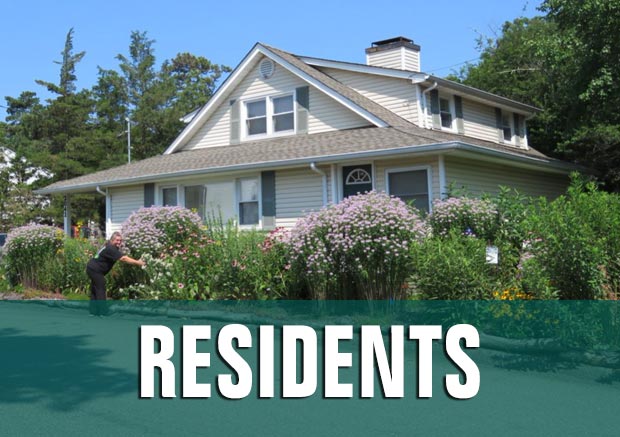
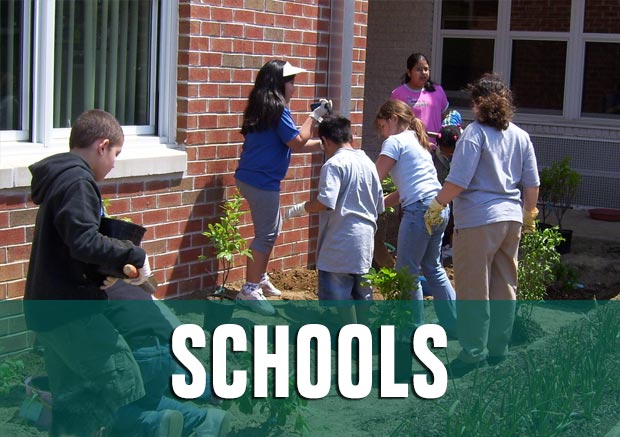
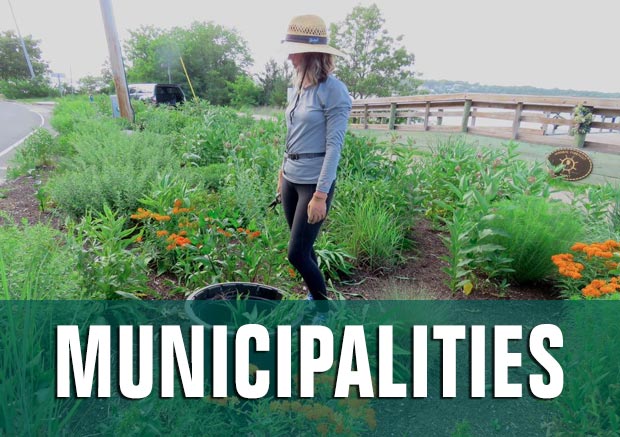
In the fall of 2022, two schools and two municipalities that enrolled in the JFY Certification Program were selected to help pilot the new initiative. Brick Township High School and Pinelands Regional High School, as well as Pine Beach Borough and Point Pleasant Borough, received funding to support completion of the certification requirements. Once enrolled in the program, participants are expected to complete several Standard Actions that reduce sources of pollution, conserve water supplies, improve stormwater management, and create or restore wildlife habitat, all of which support a healthy environment and economy. Standard Actions are based on the 8 Steps to a Jersey-Friendly Yard, which are key Jersey-Friendly Yards landscaping principles.
Resident Certification Program
The Resident Certification Program provides homeowners with a Resident Program Checklist to use as a guide towards certification. The 8 Checklist categories align with the 8 Steps to a Jersey-Friendly Yard, including: Plan Before You Plant, Start With Healthy Soil, Water Wisely, Fertilize Less, Minimize Risks When Managing Pests, Reduce Lawn Size, Create Wildlife Habitat, and Reduce, Reuse, Recycle in the Yard.
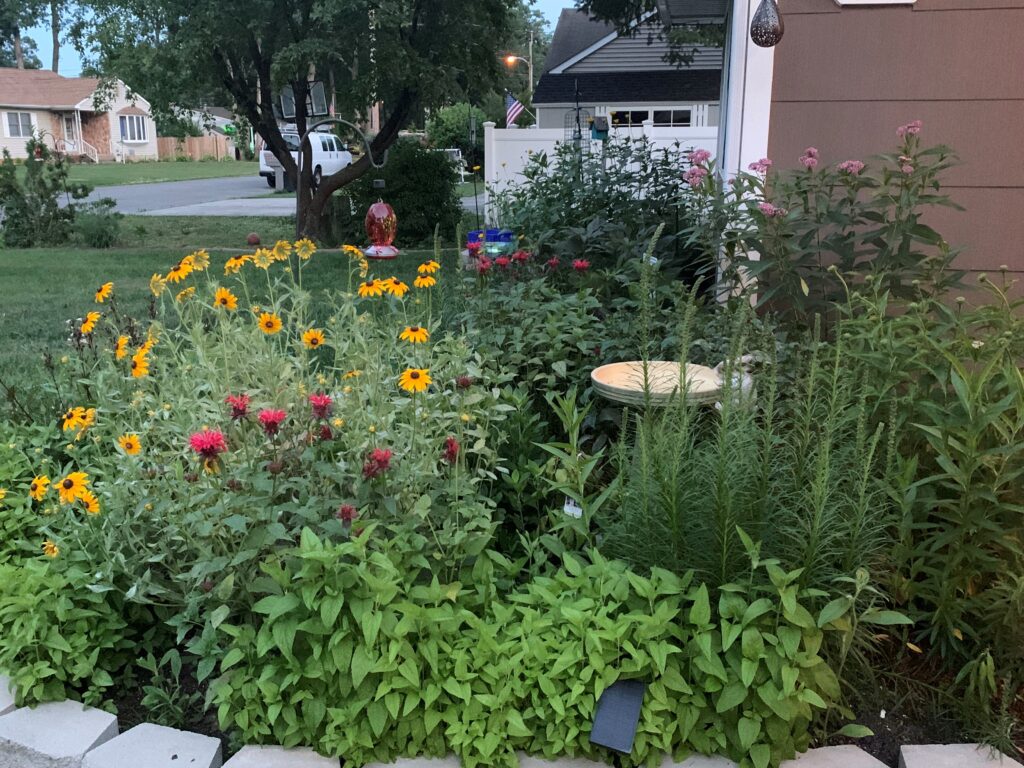
Residents assess their yard and determine which Jersey-Friendly practices they are already using and which practices they can adopt for an even healthier yard. A Checklist score of 30 or more must be attained for certification. Residents then submit at least 2 photos of their yard, showcasing best landscape management practices, as reflected by the 8 Steps. The Resident Program Checklist can be saved to record progress as residents continue to expand their list of Jersey-Friendly landscaping practices they implement at home.
Pictured is the residence of Tracy Natale. Tracy reduced her lawn size by installing a native pollinator garden. She included native plants that attract and support bees, butterflies, and beneficial insects, such as Scarlet Beebalm, Blazing Star, Joe-Pye Weed, Woodland Sunflower, Black-eyed Susan, and Blue Mistflower. The bird bath provides songbirds with water for drinking and bathing.
School Certification Program
The School Certification Program guides teachers and students towards the creation of a Jersey-Friendly Schoolyard, including a newly installed garden or enhanced landscape. The School Certification Program has 3 tiers – Creek, River and Bay, which build on each other and provide students with continuous, long-term engagement within the program. The teacher uses the 8 Steps to a Jersey-Friendly School Yard to guide students through project planning, design and implementation using lesson plans that address important topics such as soil health, water conservation, and native plants as habitat for wildlife.
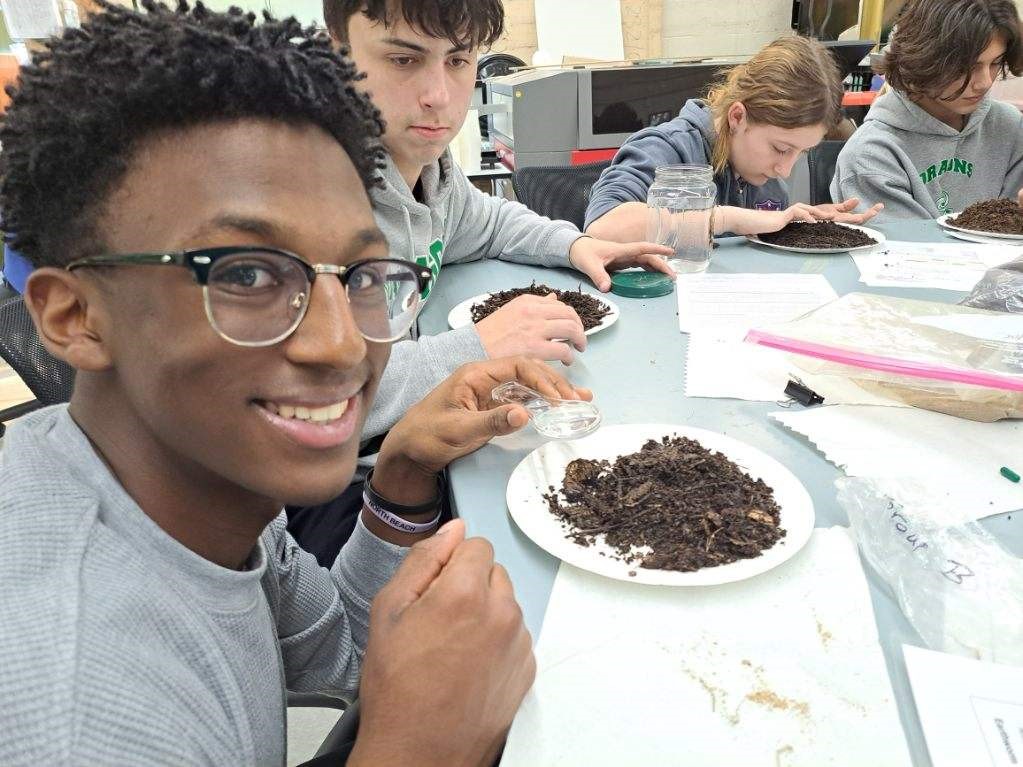
This past school year, 2022-23, Karen Walzer, Public Outreach Coordinator (BBP) and Bailey Sanders, Stewardship Specialist (BBP), with assistance from Becky Laboy, Education Outreach Specialist (OCSCD), Jessica Pinto, Erosion Control Specialist (OCSCD), and subcontractor Eileen Miller (Healthy Landscapes, LLC) provided outreach in the form of lessons, technical support and guidance to the students at Brick Township High School and Pinelands Regional High School. Students learned about the Barnegat Bay watershed and the importance of healthy local water bodies. Abundant clean water is necessary for human consumption and for the survival of wildlife. Students engaged in lessons about macroinvertebrates as bioindicators of stream health. They also made connections between clean water and healthy soil through hands-on activities focused on soil texture, soil nutrients, soil pH and life in the soil.
Students in the STEM (Science, Technology, Engineering and Math) class at Brick Twp High School, taught by Gary Paxton, focused their efforts on remediating an erosion issue in the school’s courtyard by designing and installing a new rain garden. Their garden design included a terraced slope and stone filtration system to capture and divert rain water to prevent continued soil erosion. Based on the information they received from their soil assessment, they used the Jersey-Friendly Yards Plant Database to select appropriate plants for their garden site conditions: slightly acidic, dry sandy soil, in full sun. Their species choices included drought tolerant grasses, groundcovers, shrubs and flowering perennials, such as Little Blue Stem, Bearberry, Lowbush Blueberry, Blue Giant Hyssop, Butterfly Weed, Coreopsis, Purple Coneflower, Black-eyed Susan, Aromatic Aster, Moss Phlox, Eastern Bluestar and Seaside Goldenrod. All of these plants support pollinators, as well as birds and wildlife by providing food, shelter and nesting material. In addition to the plants, bird feeders and bluebird nest boxes were installed near the garden. Water conservation practices are modeled by adding a rain barrel used to collect rain water to help irrigate the garden.
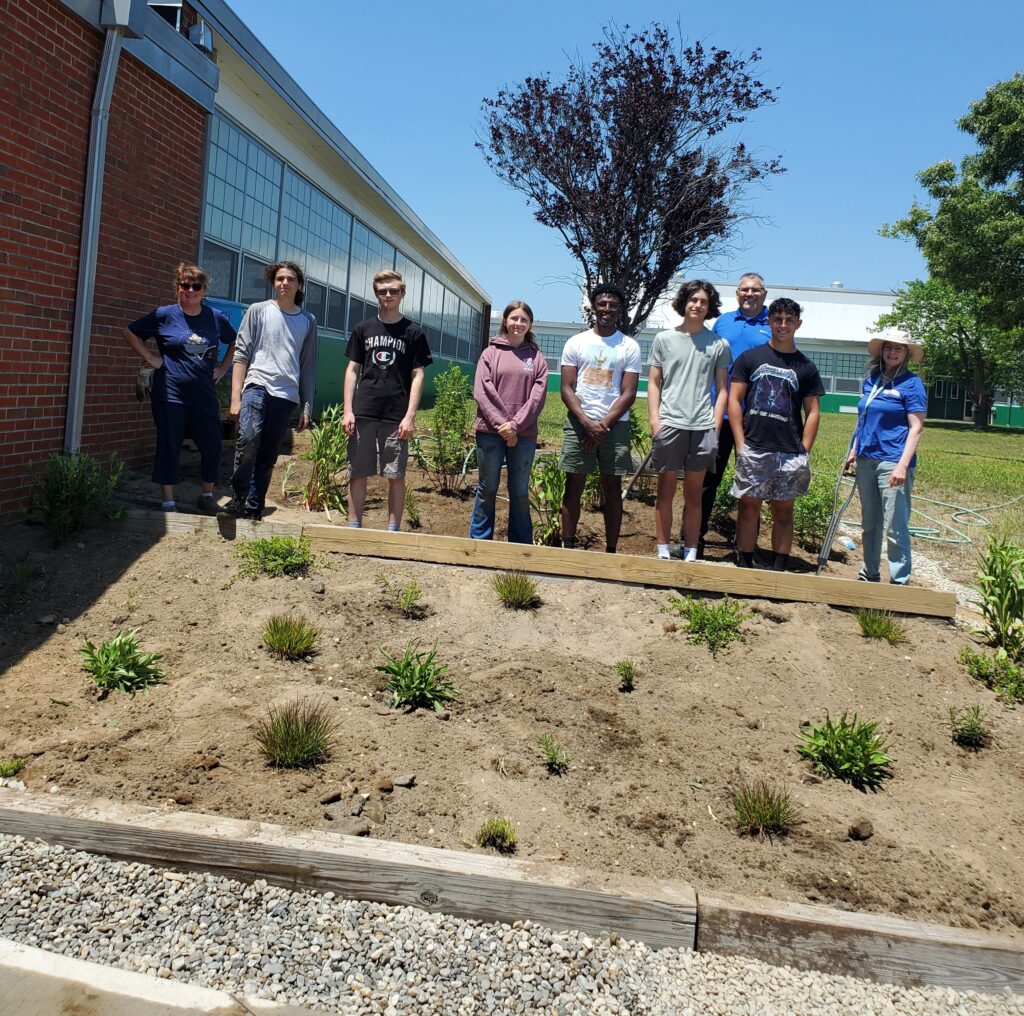
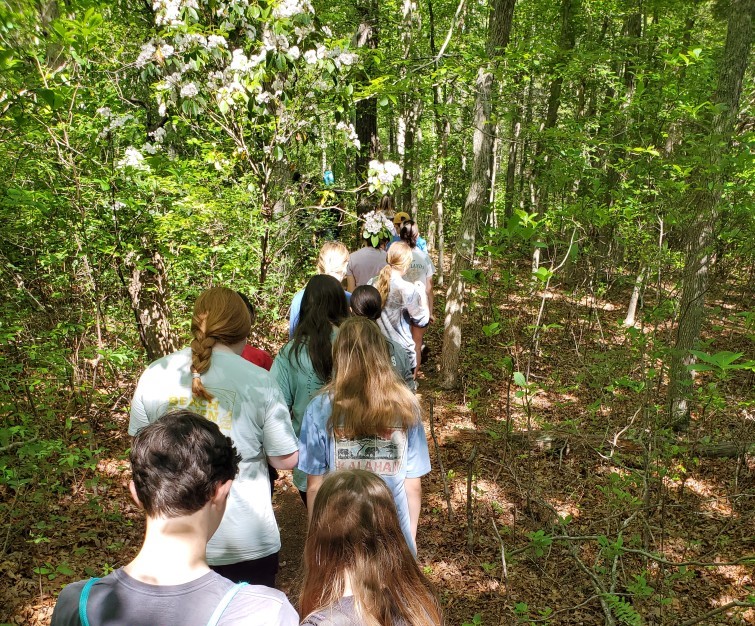
Students in Jim Ardoin’s Honors Ecology classes at Pinelands Regional High School are focusing their efforts on Giffords Mill Stream that runs through their school property, and the surrounding bogs and woodlands on their school grounds. Local green spaces are an excellent resource for residents when deciding which plants will thrive in our own backyard gardens and landscapes. The students are creating an interpretive trail that educates visitors about the benefits of native plants in local habitats, including the hardwood forest and Atlantic White Cedar swamp. Signs will identify and describe native plants, the conditions in which they thrive, and the wildlife they support. Educational information will highlight the acidic sandy soil in the area and provide information about the water quality in the bog – all data which the students collected. In addition, the students plan on installing an owl nest box to attract and support Barred Owls that typically inhabit Atlantic White Cedar forests. Soil, water, plants and wildlife are at the center of key ecological concepts embedded within the Actions the students must complete as they work towards Jersey-Friendly Yards School Certification. Emphasis will be placed on the importance of proper landscape management practices to keep the bogs and surrounding natural environment clean and healthy.
Municipal Certification Program
The Municipal Certification Program encourages municipalities to take a leading role in protecting and conserving their community’s valuable natural resources through sustainable landscape management practices. Municipalities must complete Standard Actions based on the 8 Steps to a Jersey-Friendly Yards, facilitate 2 Education & Outreach Actions and implement 2 Project Actions that reduce sources of pollution, conserve water supplies, improve stormwater management, and restore wildlife habitat, all of which support a healthy environment and economy.
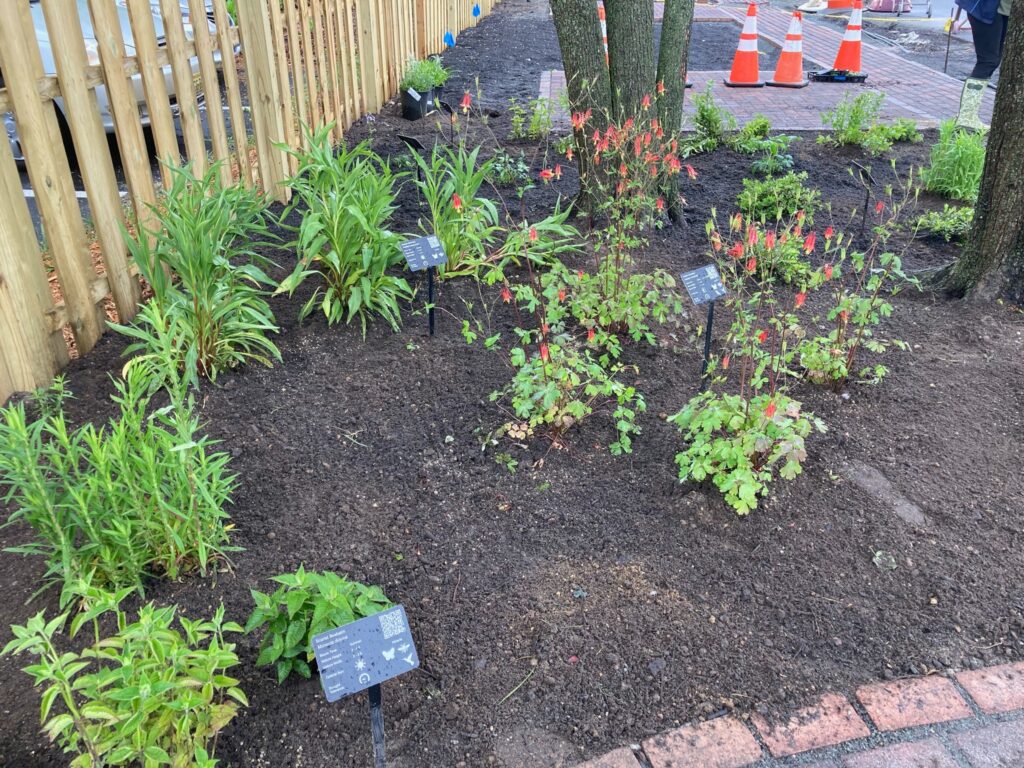
The Point Pleasant Garden Club took up the mantle on behalf of the municipality to complete the necessary Actions. Their culminating Project was the design and implementation of a pollinator garden, dubbed Pollinator Point, located at the Point Pleasant Borough Municipal Building complex. The garden club members planted over 160 individual plants consisting of 30 different species. Eastern Columbine, Whorled Milkweed, Pink Tickseed, Lyreleaf Sage and Partridge Pea, are just a few. Each species is identified in the garden with a unique sign containing a QR code linked to it’s page within the Jersey-Friendly Yards Plant Database. The JFY Plant Database provides a description of each plant, its preferred growing conditions, benefits to wildlife and other important details such as tolerance to drought and deer. Pollinator Point is a demonstration garden that showcases exactly which native plants the community members can successfully plant in their own yards.
The Pine Beach Environmental Commission is working on the Jersey-Friendly Yards Municipal Certification on behalf of their township. For one of their Project Actions, they are focusing their efforts on a small, but meaningful patch of land called Pocket Park, situated along the Toms River. The area is partially wooded with an adjacent native plant demonstration garden. Over the past few years, invasive plant species had taken over the trees and shrubs, and obscured the native plantings. A team of professionals removed the invasives, including oriental bittersweet and English ivy. These aggressive and prolific non-native plants “volunteer” in our open natural spaces and backyards when their berries and seeds are dispersed by birds. They outcompete native species for space and resources, creating monocultures devoid of biodiversity. Combating invasive plants can be a monumental task; its best to deter their growth as early as possible, and discontinue their use as ornamental plants in the home landscape. The native plant demonstration garden at Pocket Park will be restored with plantings of native species that provide food, shelter and ecological benefits for birds, pollinators, wildlife – and people!
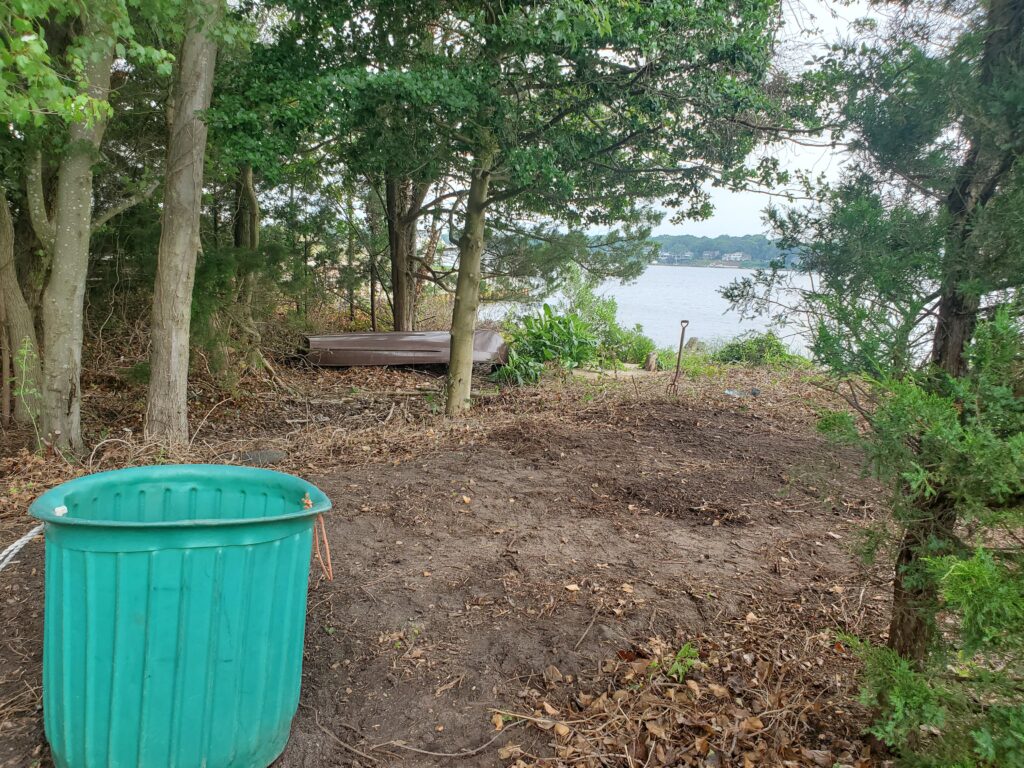
Join the growing number of residents, schools and municipalities enrolled in the Jersey-Friendly Yards Certification Program. We can all make a difference in ensuring clean water, healthy soil and a vibrant landscape! For more information about the Jersey-Friendly Yards Certification Program, please contact Karen Walzer at kwalzer@ocean.edu. If you are interested in soil-focused educational programs for your school, garden club, environmental commission or other community group, please contact Becky Laboy at education@soildistrict.org.
